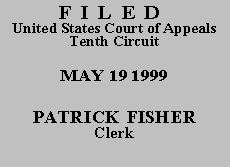

| ANTHONY C. HENRY,
Plaintiff-Appellant, v. OKLAHOMA COUNTY BOARD OF COUNTY COMMISSIONERS, a Body Politic; SHIRLEY A. DARRELL, Individually and in her official capacity as County Commissioner for Oklahoma County, Defendants-Appellees. |
|
Plaintiff Anthony C. Henry appeals from the district court's grant of summary judgment dismissing his 42 U.S.C. § 1983 civil rights complaint. He asserts that defendants violated his First Amendment rights by terminating him allegedly because he cooperated with a criminal investigation. This court exercises jurisdiction pursuant to 28 U.S.C. § 1291 and affirms.
Plaintiff was employed by Oklahoma County as a road equipment operator. He worked in the county district supervised by County Commissioner Shirley A. Darrell, who had final decision-making authority over the hiring and firing of employees within that district. In June 1995, during a grand jury investigation into alleged misappropriation of county funds on road and construction projects, plaintiff was questioned by the county district attorney's office and the Federal Bureau of Investigation. He cooperated with the criminal investigation and kept in contact with investigators on a monthly basis through November 1996. Plaintiff told a few coworkers he was cooperating, but did not tell any of his supervisors. As a result of plaintiff's reports of possible misuse of county assets, an unmarked FBI van observed the county work site where plaintiff was working on two occasions, once in June 1996, and once in November 1996. Plaintiff's supervisor asked him if he knew anything about the van, but plaintiff said he did not.
In January 1997, plaintiff used profanity and racial slurs towards a supervisor, refusing to follow the supervisor's work order, He also became angry and used profanity during an investigation of this incident by a project manager. His behavior was reported to Commissioner Darrell, who terminated his employment and immediately issued a policy statement to county employees that the use of profanity against supervisors would no longer be tolerated. Plaintiff then filed this § 1983 action.
Generally, public employment cannot be conditioned "on a basis that infringes the employee's constitutionally protected interest in freedom of expression." Connick v. Myers, 461 U.S. 138, 142 (1983). The district court concluded that plaintiff's cooperation with the criminal investigation was protected speech because it touched on a matter of public concern, and that the importance of the speech outweighed the county's interest in an efficient and effective workplace. See Lytle v. City of Haysville, 138 F.3d 857, 863 (10th Cir. 1998) (describing four-part test used to determine if public employer has contravened a public employee's free speech rights).
Defendants presented evidence, however, that none of the county commissioners or the individuals involved in plaintiff's termination had any knowledge of plaintiff's cooperation with the criminal investigation until he filed his § 1983 action, that his cooperation had played no role in his termination, and that the sole reason he was terminated was his insubordination, profanity and racial slurs. The district court concluded that plaintiff failed to come forward with any evidence that his speech had played a substantial or motivating factor in his termination. See id. at 863.
Plaintiff concedes that he never discussed his cooperation with any supervisor or any of the defendants, and he concedes the only reason ever given for his termination was his admitted insubordination and use of profanity and racial slurs. However, plaintiff asserts a trier of fact could infer that defendants terminated him because of his cooperation in the criminal investigation because (1) defendants were aware of an earlier, unrelated criminal investigation involving the use of county funds, (2) there is no record of another employee being terminated for using profanity, and (3) plaintiff's supervisor asked him if he knew anything about the unmarked van observing the work site. This evidence is nothing more than pure speculation, and the district court correctly held that it is insufficient to send the case to the jury on the issue of motivation. See Hom v. Squire, 81 F.3d 969, 974-75 (10th Cir. 1996) (plaintiff's mere belief that he was dismissed in retaliation for exercising protected speech is insufficient, by itself, to defeat a summary judgment motion).
After a de novo review of the parties' briefs and contentions, the district court's order, and the entire record on appeal, this court finds no reversible error and affirms for substantially the same reasons set forth in the district court's order granting the motion for summary judgment. The judgment of the United States District Court for the Western District of Oklahoma is AFFIRMED.
Entered for the Court
Circuit Judge
*. This order and judgment is not binding precedent, except under the doctrines of law of the case, res judicata, and collateral estoppel. The court generally disfavors the citation of orders and judgments; nevertheless, an order and judgment may be cited under the terms and conditions of 10th Cir. R. 36.3.